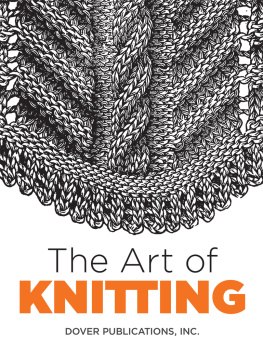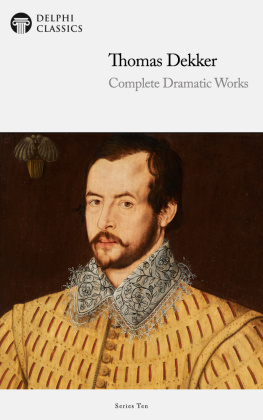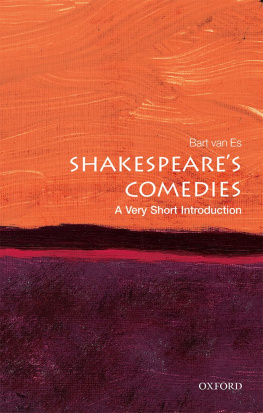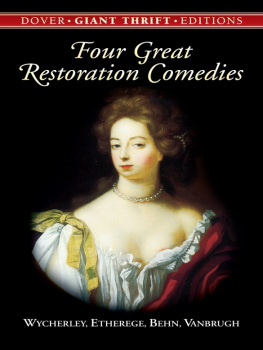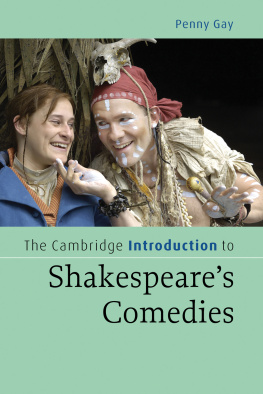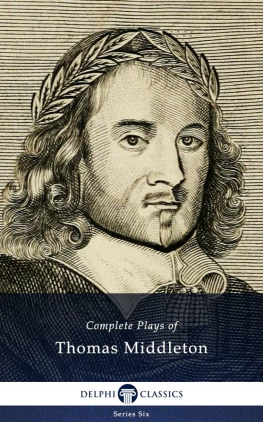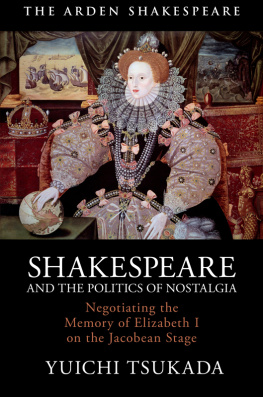Dover Publications - Elizabethan Comedies: a Basic Anthology
Here you can read online Dover Publications - Elizabethan Comedies: a Basic Anthology full text of the book (entire story) in english for free. Download pdf and epub, get meaning, cover and reviews about this ebook. City: Newburyport, year: 2017, publisher: Dover Publications, genre: Science. Description of the work, (preface) as well as reviews are available. Best literature library LitArk.com created for fans of good reading and offers a wide selection of genres:
Romance novel
Science fiction
Adventure
Detective
Science
History
Home and family
Prose
Art
Politics
Computer
Non-fiction
Religion
Business
Children
Humor
Choose a favorite category and find really read worthwhile books. Enjoy immersion in the world of imagination, feel the emotions of the characters or learn something new for yourself, make an fascinating discovery.

- Book:Elizabethan Comedies: a Basic Anthology
- Author:
- Publisher:Dover Publications
- Genre:
- Year:2017
- City:Newburyport
- Rating:3 / 5
- Favourites:Add to favourites
- Your mark:
- 60
- 1
- 2
- 3
- 4
- 5
Elizabethan Comedies: a Basic Anthology: summary, description and annotation
We offer to read an annotation, description, summary or preface (depends on what the author of the book "Elizabethan Comedies: a Basic Anthology" wrote himself). If you haven't found the necessary information about the book — write in the comments, we will try to find it.
Elizabethan Comedies: a Basic Anthology — read online for free the complete book (whole text) full work
Below is the text of the book, divided by pages. System saving the place of the last page read, allows you to conveniently read the book "Elizabethan Comedies: a Basic Anthology" online for free, without having to search again every time where you left off. Put a bookmark, and you can go to the page where you finished reading at any time.
Font size:
Interval:
Bookmark:
 DOVER THRIFT EDITIONS GENERAL EDITOR: SUSAN L. RATTINER EDITOR OF THIS VOLUME: JANET B. KOPITO Copyright Copyright 2017 by Dover Publications, Inc. All Fools is reproduced from All Fools by George Chapman, edited by Frank Manley, by permission of the University of Nebraska Press. Copyright 1968, 1996 by the University of Nebraska Press. Friar Bacon and Friar Bungay is reproduced from Friar Bacon and Friar Bungay by Robert Greene, edited by Daniel Seltzer, by permission of the University of Nebraska Press.
DOVER THRIFT EDITIONS GENERAL EDITOR: SUSAN L. RATTINER EDITOR OF THIS VOLUME: JANET B. KOPITO Copyright Copyright 2017 by Dover Publications, Inc. All Fools is reproduced from All Fools by George Chapman, edited by Frank Manley, by permission of the University of Nebraska Press. Copyright 1968, 1996 by the University of Nebraska Press. Friar Bacon and Friar Bungay is reproduced from Friar Bacon and Friar Bungay by Robert Greene, edited by Daniel Seltzer, by permission of the University of Nebraska Press.
Copyright 1963, 1991 by the University of Nebraska Press. Every Man in His Humour is reproduced from Every Man in His Humour by Ben Jonson, edited by J. W. Lever, by permission of the University of Nebraska Press. Copyright 1971, 1999 by the University of Nebraska Press. Theatrical Rights This Dover Thrift edition may be used in its entirety, in adaptation, or in any other way for theatrical productions, professional and amateur, in the United States, without fee, permission, or acknowledgment. (This may not apply outside of the United States, as copyright conditions may vary.) Bibliographical Note This Dover edition, first published in 2017, is a new compilation of six plays reprinted from standard editions. (This may not apply outside of the United States, as copyright conditions may vary.) Bibliographical Note This Dover edition, first published in 2017, is a new compilation of six plays reprinted from standard editions.
A Note has been provided specially for this edition. International Standard Book Number ISBN-13: 978-0-486-81606-7 ISBN-10: 0-486-81606-0 Manufactured in the United States by LSC Communications 81606001 2017 www.doverpublications.com Contents Robert Greene Thomas Dekker George Chapman Ben Jonson, George Chapman, and John Marston Thomas Middleton Ben Jonson [The dates given for the plays are approximate, given the numerous versions published and performed at the time.] Note The six plays selected for this edition represent the great comedic achievements of the Elizabethan era and, as the successor to Queen Elizabeths reign, the Jacobean period. At this time, theaters were opening up in London; poetry and music were flourishing. In addition, the well-educated queen brought her own curiosity and zest for learning to the creative spirit of the time. Whereas Elizabethan dramas such as The Spanish Tragedy and The Duchess of Malfi explored the depths of human nature by weaving madness, murder, and immorality into their plots, the comedies of the time offered disguises, reversals, and, ultimately, satisfying endings to their audiences, along with entertaining word play (puns, double entendres, and bawdy language). Robert Greenes Friar Bacon and Friar Bungay introduces the historical figures Roger Bacon and Thomas Bungay.
Bacon, the philosopher and scholar, and Bungay, a Franciscan friar like Bacon, both have reputations as magicians. In the plays complicated plotting, misunderstandings get in the way of marriage, and the displays of magic, uncouth miracles, in the words of Friar Bungay, include Friar Bacons creation of an enormous brazen head conjured by the friar that will circle England round with brass. Greene used an anonymous sixteenth-century romance as his source for the play, changing, however, Friar Bacons achievements from scientific to magical in nature. The Shoemakers Holiday, by Thomas Dekker, begins with a romantic complication: the love of an Earls son and a grocers daughter. The mismatch between Roland Lacy and Rose is described by Roses father as follows: Too mean is my poor girl for his high birth / Poor citizens must not with courtiers wed. The societal obstacle to the match will play out as the plot unfolds against the backdrop of Englands wars with France during the 1400s.
The master shoemaker, Simon Eyre, for whom Lacy works in disguise to avoid going to war, fills the play with puns and double entendres such as snipper-snapper, trullibubs, soused conger, and pishery-pashery), all to the entertainment of Elizabethan playgoers. The first printing of All Fools took place while its author, George Chapman, was in prison. He had been jailed along with Ben Jonson and John Marston, his co-authors for Eastward Ho! (included in this Dover edition), for a perceived insult to King James Imocking his Scottish accentin that work. Known for his translations of Homers Iliad and Odyssey, Chapman based All Fools on two works by the Latin playwright Terence. A story of two knights whose world views are quite differentone looks askance at honesty, and the other embraces itthe comedy revolves around various forms of deception, expressed by Cornelio, a jealous husband, as gulling.The point of universal gullibility is driven home repeatedly throughout the play. Like The Shoemakers Holiday and A Trick to Catch the Old One (which appears later in this collection), Eastward Ho! is a city comedy.
The three co-authors of this Jacobean workBen Jonson, George Chapman, and John Marstonset the play in London amidst a mix of social classes and a variety of characters. At this time, in less than a hundred years, the citys population had more than quadrupled, with a much greater mix. Whereas some of the Elizabethan comedies used magic as a plot element, the city comedy was more realistic. Utilizing satire and targeting the characters vanity, greed, and hypocrisy, Eastward Ho! also employs various forms of deception in the twists and turns of its complex plot. The Prologue mentions westwards, a reference to Westward Ho!, a play by Thomas Dekker and John Webster that was performed at roughly the same time as Eastward Ho! The names of several of the charactersPecunious Lucre, Hoard, and Moneylovein Thomas Middletons city comedy A Trick to Catch the Old One leave no doubt as to the central motif of the playmoney. Along with usurers and creditors, all play a role in advancing the plot.
The Old One of the title is the spendthrift protagonist Witgoods old fox mine uncle, and the nephews indebtedness to his Uncle Lucre leads to trickery and deception in order for Witgood to regain his good name. Witgood cons both Lucre and his rival, Hoard, with the promise of financial gain in a romantic scheme, further enforcing the corrupting power of money. First performed in 1598, Ben Jonsons play Every Man in His Humour remained popular for centuries after its original publication and performance in the early 1600s. Humour, in addition to its relationship to comedy, was believed to be an inherent temperamentcholeric, melancholic, phlegmatic, or sanguinethat determined a persons character. First used in Greek and Latin drama, the later use of the type could, for example, identify an obsession. Kitely, a merchant, is motivated by jealousy (choleric).
Edward Knowwell, overly concerned for his sons future, is driven to act by his anxiety (melancholic). William Shakespeare performed in the play, possibly as Knowwell. The edition reprinted here is the revised Folio edition (1616), which replaced the original Italian setting and names with English names, and was set in London. FRIAR BACON AND FRIAR BUNGAYRobert Greene [Characters of the Play KING HENRY THE THIRD EDWARD, PRINCE OF WALES, his son EMPEROR OF GERMANY KING OF CASTILE DUKE OF SAXONY
| LACY, Earl of Lincoln WARREN, Earl of Sussex ERMSBY, a Gentleman |  |
Font size:
Interval:
Bookmark:
Similar books «Elizabethan Comedies: a Basic Anthology»
Look at similar books to Elizabethan Comedies: a Basic Anthology. We have selected literature similar in name and meaning in the hope of providing readers with more options to find new, interesting, not yet read works.
Discussion, reviews of the book Elizabethan Comedies: a Basic Anthology and just readers' own opinions. Leave your comments, write what you think about the work, its meaning or the main characters. Specify what exactly you liked and what you didn't like, and why you think so.

